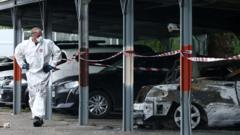Recent attacks involving arson and gunfire at multiple French prisons have led authorities to suspect that drug gangs are orchestrating these violent acts in response to government efforts to combat drug trafficking.**
Violence Erupts in French Prisons: The Suspected Role of Drug Gangs**

Violence Erupts in French Prisons: The Suspected Role of Drug Gangs**
Coordinated arson and gun attacks on French prisons suggest drug gangs may be retaliating against government crackdowns.**
French prisons have been thrust into chaos following a series of violent incidents that have authorities on high alert. Since Sunday night, there have been 12 recorded attacks, including a disturbing trend of arson and gunfire directed at prison facilities. Initially, law enforcement kept all avenues of investigation open, including far-left extremists or foreign influences; however, evidence increasingly points towards the involvement of drug gangs reacting to a recent surge in government crackdowns against narcotics.
Interior Minister Bruno Retailleau strongly believes that the violence is the work of "drugs-yobs," emphasizing, "It’s not they who have declared war on us. It's we who declared war on them with our new law on drugs trafficking." In a coordinated three-night operation, gang members have set cars ablaze outside various prisons and even a training center for prison officers. Some attacks employed firearms, and many were accompanied by graffiti that bore the initials DDPF, which stands for "Droits des Prisonniers Français" (Rights for French Prison Inmates).
The DDPF group, ostensibly advocating for the rights of inmates, seems to be a new entity, having garnered attention after posting a video on Telegram showcasing the burning of a prison officer's vehicle. The video also criticized Justice Minister Gérard Darmanin for initiating what they perceived as a war against prisoners.
Interestingly, the supposed rights advocacy doesn't align with typical drug gang behavior, nor do far-left groups appear to be involved as they usually have a more eloquent and philosophical basis for their activism. Surveillance footage shows the attackers dressed in clothing typical of drug gang members, further solidifying the theory.
Despite some speculation regarding potential foreign manipulation or interference, especially involving Algeria or Russia—countries with strained relations with France—the prevailing theory among investigators is that drug gangs are both capable and motivated to execute these attacks.
The French government, with an unusual political alliance between right-wing Interior and Justice ministers, is pushing through legislative measures that aim to curtail drug trafficking more effectively. New initiatives include the establishment of a specialized prosecutor’s office, enhanced powers for investigators, and special protection for informers. Furthermore, two new high-security prisons are set to house the country’s most notorious drug lords, with stricter regulations on communication and visitation to disrupt their operations from within.
As authorities grapple with these unprecedented prison attacks, they perceive evidence of an intimidated drug trade, prompting this retaliatory violence. How the government will respond remains to be seen, but catching a perpetrator may soon reveal more about the instigators of these alarming events.




















